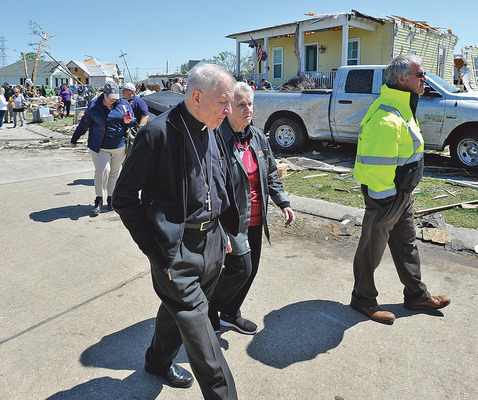
A platform that encourages healthy conversation, spiritual support, growth and fellowship

NOLACatholic Parenting Podcast
A natural progression of our weekly column in the Clarion Herald and blog

The best in Catholic news and inspiration - wherever you are!
Catholic Charities:‘Forever’ responders in NOLA disasters
-
 By Peter Finney Jr.
By Peter Finney Jr.
Clarion Herald
Ever since Hurricane Katrina nearly 20 years ago, Catholic Charities Archdiocese of New Orleans (CCANO) has learned the lessons of how best to respond to a natural disaster, and one of the simplest ways to describe its response is that of a long-term responder.“We are not first responders, we are not the first ones out there,” explained Deacon Martin Gutierrez, chief operating officer of Catholic Charities and a permanent deacon assigned to St. Clement of Rome Parish in Metairie. “But, we are there to provide assistance for a long while. We have to coordinate with civil authorities. We just need to make sure we do what we do best.”
Ability to pivot quickly
Flexibility is the byword, Deacon Gutierrez said, because every hurricane is different in how it affects the eight civil parishes of the archdiocese. After Hurricane Ida in August 2021, for example, the civil parishes of St. Charles and St. John the Baptist sustained heavy damage, and areas to the south and west of New Orleans, such as Terrebonne and Lafourche civil parishes that are part of the Diocese of Houma-Thibodaux, took massive, direct hits.
“The first thing we must do is an assessment of the damage, and that depends where the impact was if it’s a hurricane,” Deacon Gutierrez said. “We will normally go out there with the archbishop and our staff members to assess what the immediate needs are right away. We don’t need to be providing the assistance ourselves, so oftentimes what happens is that we connect the dots because of the connections we have with our (Catholic church) parishes. And then, we can work with organizations like Second Harvest Food Bank to make sure resources are deployed where they are most needed.”
Deacon Gutierrez said what made Hurricane Ida so difficult was the widespread nature of its damages.
“Ida basically hit every single (civil) parish of the archdiocese,” he said. “Unlike other hurricanes where the damage has been more concentrated, Ida was very spread out.”
Catholic Charities often provides case managers to help those impacted by the storm find temporary housing, food and other resources. Even with Ida nearly 22 months in the rear-view mirror, Catholic Charities is still helping families who have had to leave their damaged homes or apartments.
“We have a case management program that is contracted by the state to provide assistance to families still dealing with Ida,” Deacon Gutierrez said. “In the process, you end up learning about other needs, so you end up trying to deal with that, too. But the main goal for housing is to bring them back to where they were prior to Ida.”
Padua residents cared for
Catholic Charities also operates a residential program, called Padua Community Services, that provides specialized care and residences for children and adults with intellectual and developmental disabilities. Twenty-seven children and adults live at Padua House in Belle Chasse, and another 12 live at two community homes in Metairie and Gretna.
Just last week, Deacon Gutierrez and Marianite Sister Marjorie Hebert, president and chief executive officer of Catholic Charities, drove to Bunkie, Louisiana, to check on a possible relocation site, a former Winn-Dixie store converted into a shelter equipped with hospital beds and other supplies, for the medically frail residents.
Catholic Charities also has an agreement with St. Mary’s Cathedral in Natchez, Mississippi, for emergency housing in a facility across the street in case of a mandatory evacuation order in New Orleans.
Seven dioceses network
Each of the seven dioceses of Louisiana has a Catholic Charities, and the leaders have worked well together in coordinating disaster response.
“We are in constant communication with them, especially the ones in the southern part of the state,” Gutierrez said. “Whenever something happens in Houma-Thibodaux or Lake Charles or Baton Rouge, we are there, and they can come to us whenever we need it too. That’s an ongoing relationship that we have.”
The 114 church parishes within the archdiocese provide a geographically dispersed network that Catholic Charities can use to provide help.
“Many times what we need is office space for case managers or a place for a distribution of some sort,” Deacon Gutierrez said. “Parishes have gotten very good at responding in that way. There’s a very good, informal network among the parishes who help each other out. Unfortunately, we’ve had quite a few disasters over the years, and some people have become very good at that.”




